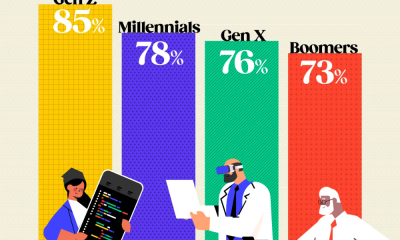Tech
Is Immortality Achieved? Man employs artificial intelligence to maintain his consciousness for his family.

Every year, cancer claims the lives of around 10 million people worldwide, a stark reminder of the urgency behind finding a cure. While some believe that immortality can only be attained through spiritual means, rapid advancements in technology are offering new perspectives on life, death, and legacy.
Michael Bommer, a 60-year-old man from Germany, is facing terminal cancer and understands that he will soon leave his loved ones behind.
However, thanks to a groundbreaking initiative by an AI-powered legacy platform called Eternos, he can remain a part of their lives in a unique way. The platform has created an interactive AI version of Michael, allowing his family and friends to engage with his memories and ideas through video.
A New Way to Leave a Legacy
Eternos aims to redefine how we think about legacies, moving beyond static photographs and documents.
Michael was captivated by the idea of a lifelike AI that could respond to questions about his life, decisions, and even generate new insights.
“We are motivated by the desire to create lasting legacies,” Eternos explains.
To build this AI version of Michael, the company guided him through a detailed process. He recorded 300 training phrases to capture the nuances of his real speaking voice, including emotion, intonation, and pronunciation.
These recordings were then processed using advanced neural voice AI technology, requiring around three days of continuous computing power and additional human editing.
The result is a customized speech model that can respond in Michael’s authentic voice.
Capturing Memories and Emotions
With the help of an Eternos legacy advisor, Michael spent several weeks recording his thoughts and memories using his mobile device.
He responded to a curated list of 150 questions designed to evoke rich recollections of his life. This approach allowed him to share his insights at his own pace, and he plans to continue this as long as he can.
When Michael and his wife first interacted with the AI version of him, they were struck by its realism. They asked it questions about his life, family, and career, and during one touching moment, his wife requested a sweet message before going to sleep.
The AI responded tenderly: “My love, have sweet dreams and I love you very much. Have a peaceful sleep.”

Finding Closure
For Michael, this project has been a source of comfort and closure.
“It took this closure and made it available for my wife and kids, even for my grandkids who are not yet here. It is a feeling of great relief,” he shared.
As technology continues to evolve, initiatives like Eternos offer a fresh perspective on how we can preserve our legacies.
While traditional immortality may remain an elusive goal, the ability to create a digital presence that can interact with loved ones offers a new way to stay connected, even in absence.
Michael’s journey is a poignant reminder that through innovation, we can explore new forms of remembrance and legacy.



























